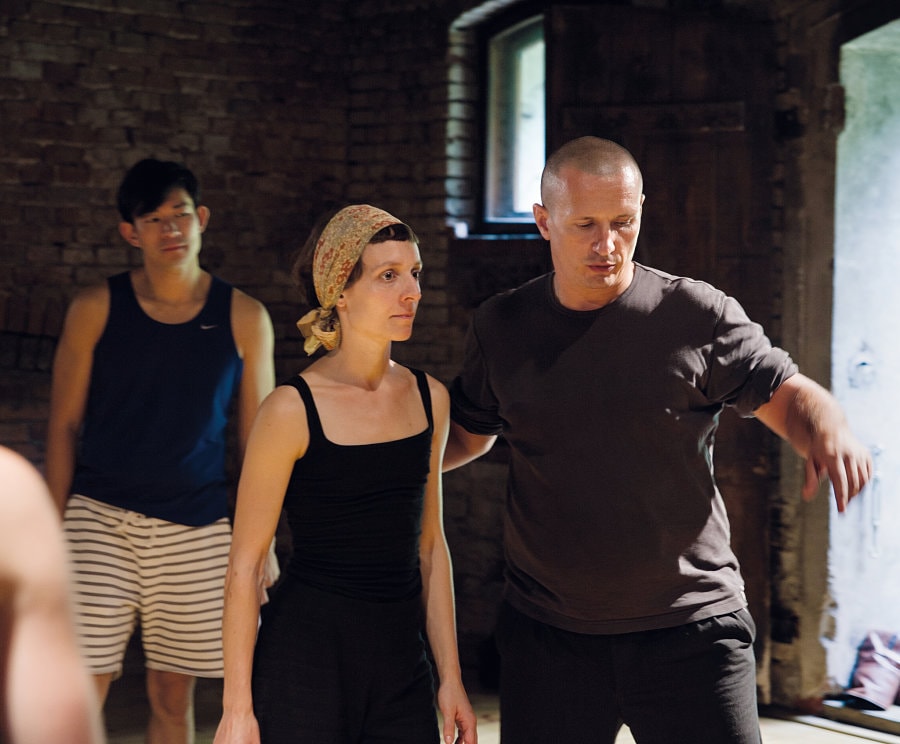Emma Crane Jaster, who plays Eurydice as well as a Sentry and a servant to the blind Tiresias in the Cutting Ball Theater/Teatr ZAR production of Antigone, grew up in Maryland—her parents were founding members of Bethesda’s Round House Theatre—and started working onstage with her father, a practicing mime, at age six. From there, her training took her “all over the place,” she says with an expansive gesture—to Shakespeare & Company in Massachusetts for “classical chops”; to the Lecoq mime school in Paris; to India to learn Kuttiyattam, traditional Sanskrit theatre; and to Taiwan, where she traveled with the troupe of Zen drummers that she’d met while in residence at Robert Wilson’s Watermill Center on Long Island. It was after the Taiwan adventure and working stays in New York City and D.C. that she moved to San Francisco and landed a gig with Cutting Ball, choreographing Melrose’s production last spring of Communiqué N˚ 10, a French play about the 2005 Paris riots. That led to Antigone auditions.
“I’ve always had an affinity with European traditions,” reasons Jaster, whose degree from Amherst College is in theatre and dance, “although I never specifically studied Grotowski technique. Still, meeting ZAR, it all feels very familiar.” Her eclectic background, as well as what she calls a “naturally bossy” personality, has served her well in Brzezinka. In her judgment, “The best thing about this residency is its singularity of focus. As an artist, our lives are so scattered—but here my only job is to be present for the work. That’s a gift.”
Read Jim O’Quinn’s in-depth feature on the collaboration between Cutting Ball and Teatr ZAR here.
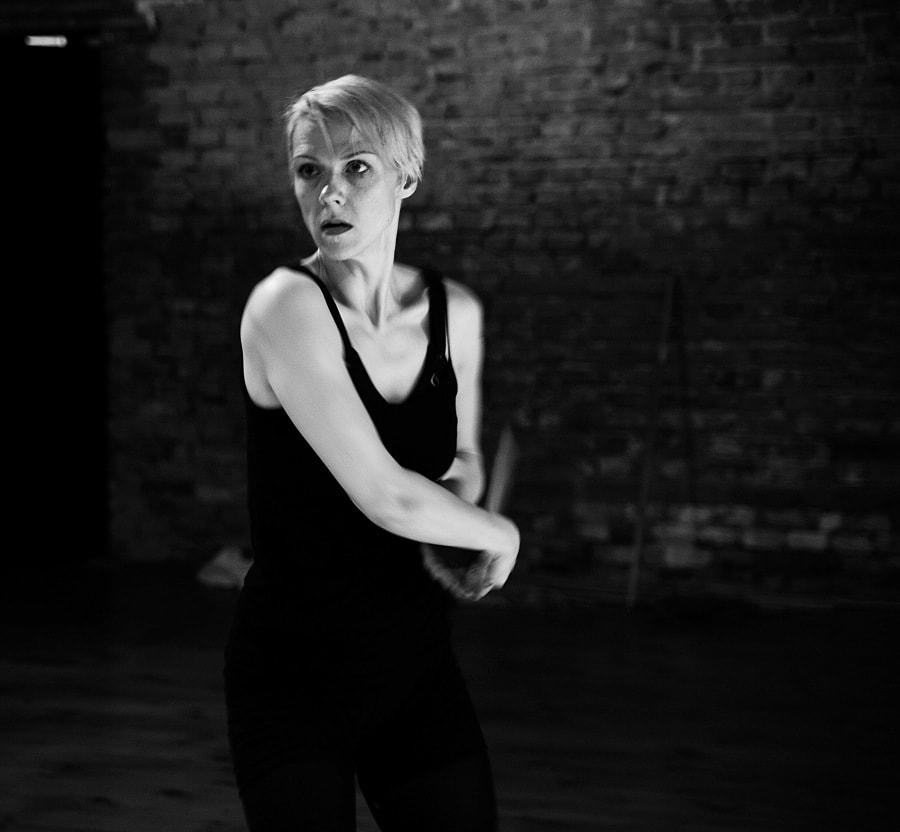
Thirty-five-year-old leading actress Madeline H.D. Brown already had a BFA in acting from Santa Fe University of Art and Design under her belt when she came to San Francisco in 2007 from London, where she’d spent six-and-a-half years studying corporeal mime and traveling with a cabaret-style circus. Stateside, she became a member of the inventive Mugwumpin troupe and took on an array of roles (most recently, that of Our Town’s Stage Manager in Shotgun Players’ production, which closed in January). Her conversation with Cutting Ball began when she saw a workshop of Rogers’s 2012 ZAR-inspired show Tontlawald, which led to her performing in the show and taking part in a number of readings, including one for Antigone. She pursued the title role, and got the part she wanted.
Now, approaching Antigone through the lens of Grotowski’s technique, she’s reminded of the plastiques she once studied at Dublin’s Trinity College, which inspired her so deeply she tattooed a “center core” symbol on her midsection. “I’m fascinated by the levels of artistry and discipline of these Polish artists,” she avows. “I’m a sponge, just soaking it up. I love being so isolated, letting our social masks dissolve, getting to a deeper level of working.”
Brown is less sanguine about Brzezinka’s practical aspects—“There’s no peanut butter, I’m a vegan, and I miss my family so much I’ve started smoking again”—but she’s intent upon seizing the moment: “Grotowski talks about the holy actor. I want to be that with a living wage.”
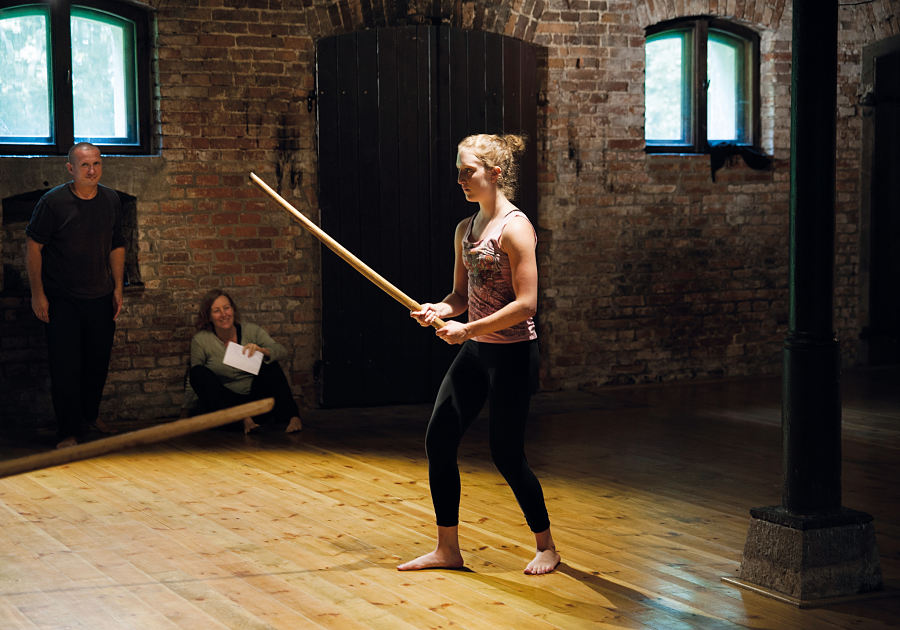
Hannah Donovan, who assumes the role of Antigone’s fearful sister Ismene, has a leg up on her colleagues in dealing with the rigors of Brzezinka, she figures, by virtue of her experiences in the wilds of Zimbabwe, where she worked for a time with lions in a wildlife preserve, and in Ecuador, where she toured remote areas in search of indigenous theatre. “Nature and the environment are really important for me—I became particularly conscious of that in Ecuador,” says the 23-year-old, who grew up in California’s Marin County and attended USC in Los Angeles before heading off to London for a year at BADA. “To be here in this place’s remote natural environment, spending time outside, has been really, really nice.”
Donovan had “a general knowledge of Grotowski from theatre history, nothing in depth,” she notes, and she’d never seen a Cutting Ball production when she found an ad for Antigone auditions in Backstage. “It sounded right up my alley—and it involved travel to Poland, so I decided to go for it!” she grins. As for her ultimate career aspirations, Donovan is still open to a range of possibilities—getting to know those lions, it seems, made its mark. “In college I had a clear-cut path in theatre,” she acknowledges, “but who knows? I may want to work with wildlife again.”
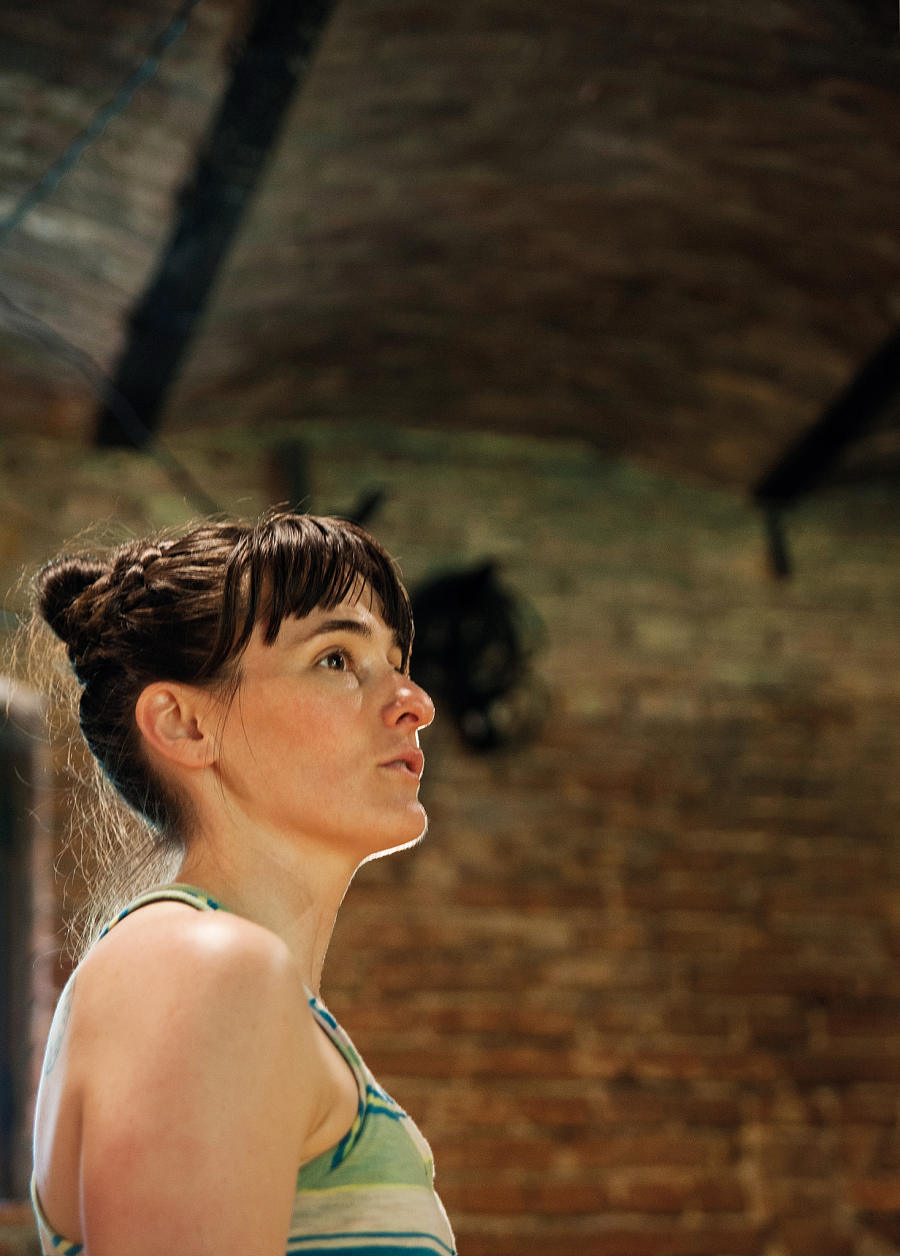
Elissa Beth Stebbins, 33, who takes on the pivotal role of Chorus Leader, admires translator Daniel Sullivan’s sometimes cheeky treatment of Sophocles’ text—“I especially like the remnants of formality and poetry that he hangs on to,” she allows. Greek theatre was on her radar as she earned theatre and English degrees at Santa Clara University and studied, like Emma, on the East Coast at Shakespeare & Company, but Grotowski had scarcely come to her attention: “I had only heard of him vaguely, and wasn’t familiar with the training.” Her decision to audition for Antigone was prompted in part by her admiration for Cutting Ball’s work, and by the prospect of travel—prior to this Brzezinka excursion, she’d never been out of the country before.
“Life in San Francisco is so busy,” Stebbins says, “and it’s been hard to earn a living doing things that bring me joy. This preparatory session gives me the ability to focus and the time to dig in. It’s free of distractions—it’s just this.” If she’s enamored of the new techniques she’s learning, that goes double for the colleagues she’s getting to know. What does Stebbins want to be when she grows up? “I want to be Madeline, and Emma, and Paul, and Jason,” she declares with an affectionate grin, going on to name all seven of her castmates.
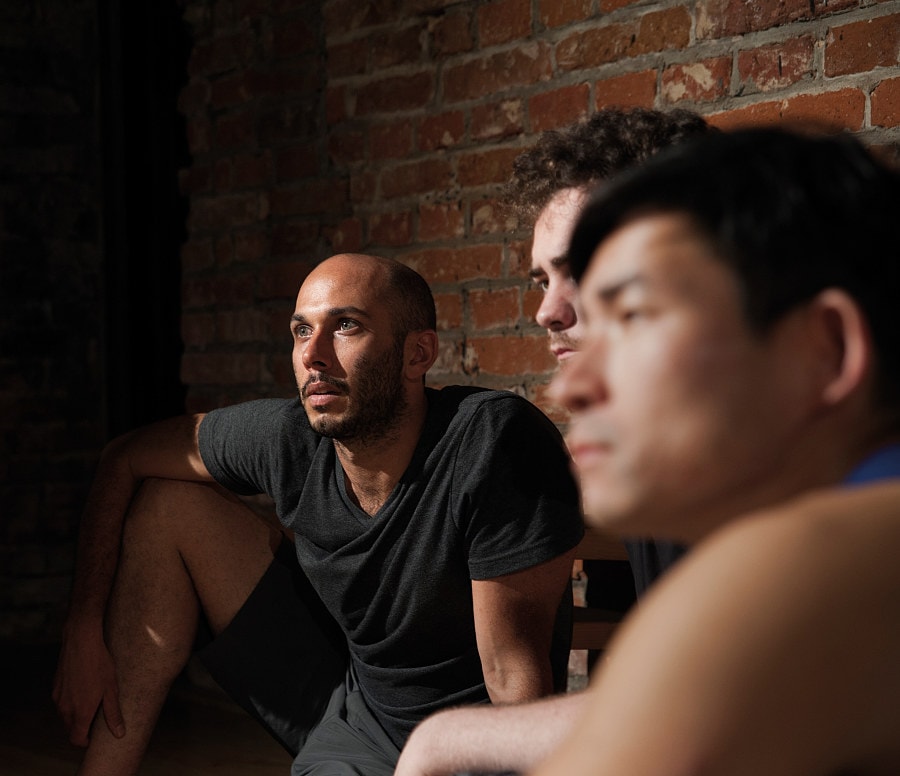
Dance and theatre have been Wiley Naman Strasser’s specialties since childhood (his first work with Cutting Ball was in Melrose’s campy Frank L. Baum adaptation Ozma of Oz), so playing the lovesick Haemon, son of Creon, in Antigone is another step in a concerted effort to move his career onto a serious physical-theatre track. “Working with ZAR is totally right,” affirms the 28-year-old, a Santa Cruz native now living and working in San Francisco. “They create a holy experience. They combine the physical, the musical and the emotional in a vibrant way that I’m always searching to navigate. How do you use all those pieces of yourself?”
Strasser had more basic information about the Grotowski tradition under his belt than did some of his fellow actors. “I read Towards a Poor Theatre a couple of years ago,” he notes, “and I saw ZAR’s triptych at UCLA Live in 2008—I wasn’t ready for it!”
Now Strasser, a graduate of UCLA who wrapped up 2014 playing multiple roles in Shotgun Players’ Our Town, figures that readiness is relative. “I don’t want to figure out everything at once,” he says, viewing the onslaught of training in Brzezinka with a mixture of ruefulness and self-confidence. “What happened there is the dream—to be doing theatre that’s exciting to me and traveling the world.”
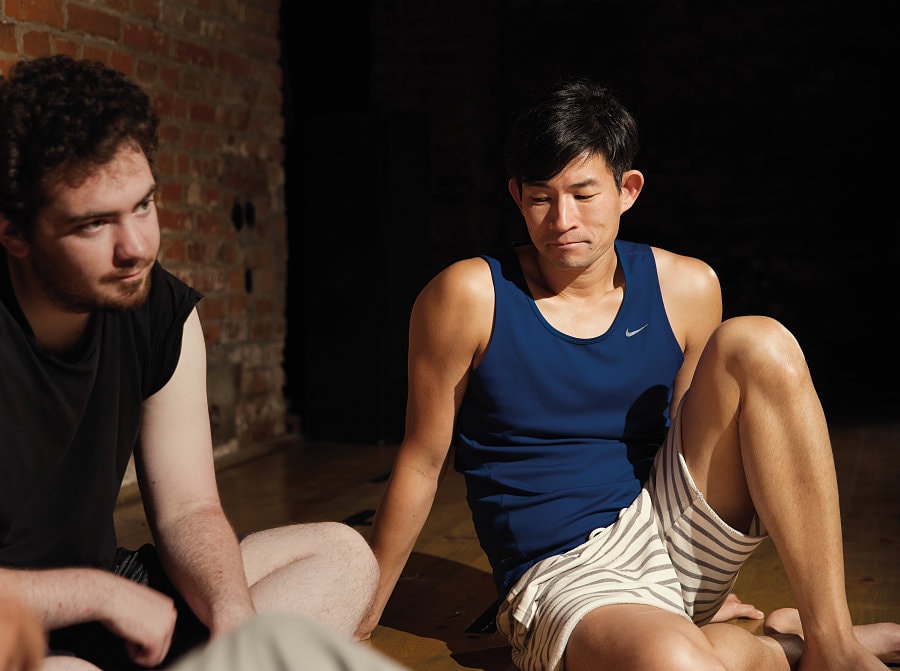
Tim Green thinks he may be more out of his element in Brzezinka than most of his collaborators. “This is all very foreign to me,” confesses the 22-year-old actor, who dropped out of theatre school in Indiana two years ago and returned to his home base in the Bay Area half expecting to “crash and burn.” He’d never seen Cutting Ball’s work, but was chosen at auditions to play the Messenger, whose graphic accounts of offstage goings-on propel Antigone’s plot to its dark conclusion. “The reason I’m an actor is that I like to tell stories,” Green observes, “and I figure as long as I can keep doing that I’ll be happy.” He’s clearly in the right place.
Green “knew nothing about Grotowski” before beginning work on this production, he continues, “but now I’m absorbing it all. I’m too in it at the moment to have a real opinion.” That aside—and despite his initial uneasiness with “the pastoral-ness of this whole business”—he sees great value in the expanded preparation and group interaction Brzezinka affords. “We’ve already got such a supreme leg up on the production process in general,” he enthuses, “and we’re bonding together as a cast five full months before ever going into rehearsal. We’re a unit already!”
Jason W. Wong, 38, came to the part of Kreon, the unforgiving king who is Antigone’s chief antagonist, with preconceived notions, but his time at Brzezinka has given him a new perspective. “I’ve discovered the other side of Kreon—he’s not just a cut-and-dried character,” Wong thinks now. “He’s not just a bastard general who’s intent upon revenge; he’s also a father who lost his eldest son in the war and is trying to rebuild the city.”
A more complicated Kreon suits Rogers’s vision of the play, and makes the whole enterprise more palatable to Wong, who has a long history of readings and workshop productions with Cutting Ball in the years since 1998. That’s when he moved to San Francisco from London, where he had studied fine art, experimental film and performance art. His training continued at American Conservatory Theater’s studio, though Grotowski was never on the academic agenda.
“Building ensemble is something we don’t have a chance to do very often—working with the same crew of actors over time—and that’s how so much energy is being generated here,” observes Wong, who misses having days off to clear his head, but nevertheless counts Brzezinka as a creative and artistic windfall.
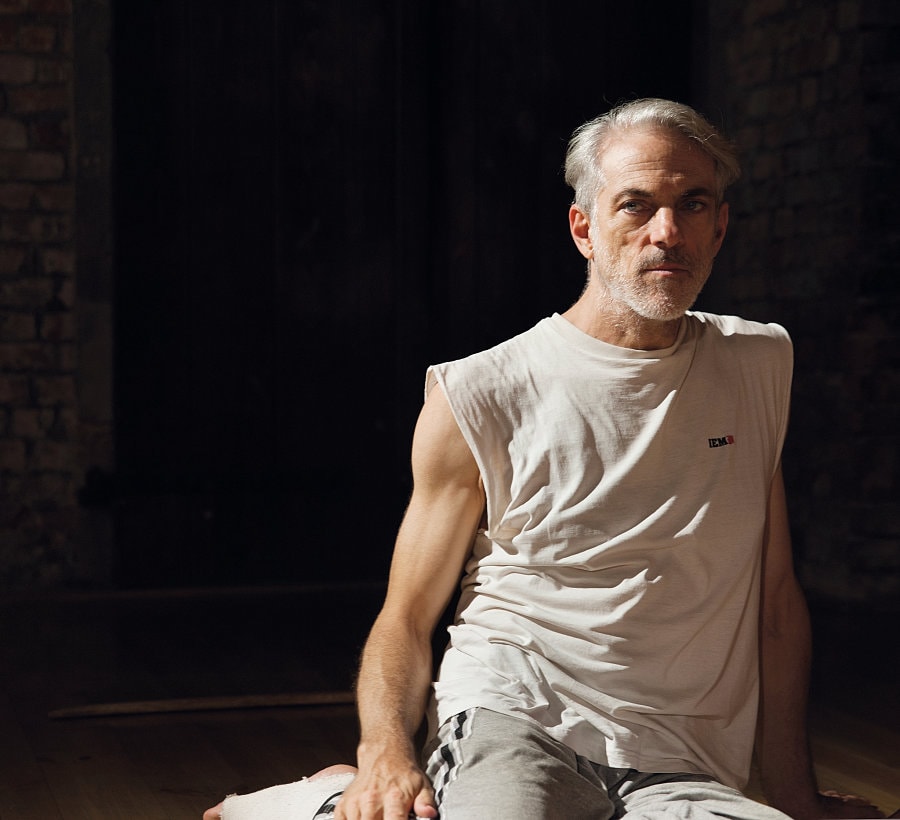
Paul Loper is acutely aware of his seniority among the Antigone players—he turned 56 three weeks after the Brzezinka session ended. Age, of course, is a necessary attribute of the blind prophet Tiresias, the character he’s playing, but that doesn’t make the rigors of Grotowski training any less challenging, even for an actor who’s spent most of his life as a dance professional. “My musculature, my hip sockets!” Loper cries in mock anguish, eyes twinkling.
Loper worked in community theatre in Seattle, studied dance formally for two years in conservatory, then went to work as a dancer, choreographer and dance teacher. Now, with maturity, he’s turning increasingly to theatre, “being more intentional about finding projects,” he says. A friend introduced him to Cutting Ball’s work, and an audition landed him the Tiresias role.
He had some rudimentary awareness of the training attached to the project—in his first years as a dancer he took a Grotowski workshop in Seattle where, in keeping with Grotowski’s penchant for self-revelation, he stripped off his clothes as the final beat of an improvised solo; and he remembers being impressed by Andre Gregory’s admiration for the Polish master in the film My Dinner with Andre. “This is all in keeping with the idea of integrating various aspects of myself, the artistic side as well as the business and community side,” Loper reasons. “I’m interested in discovering how the changes we need to make in the world connect to theatre and the performing arts.”

